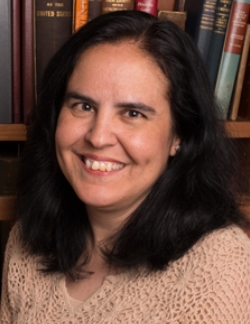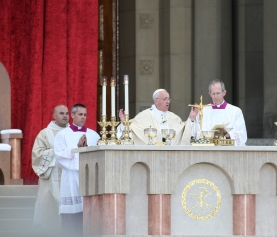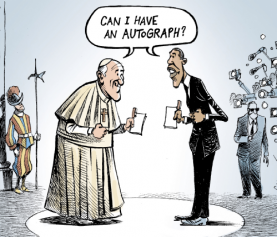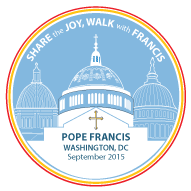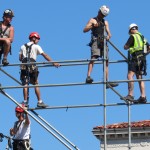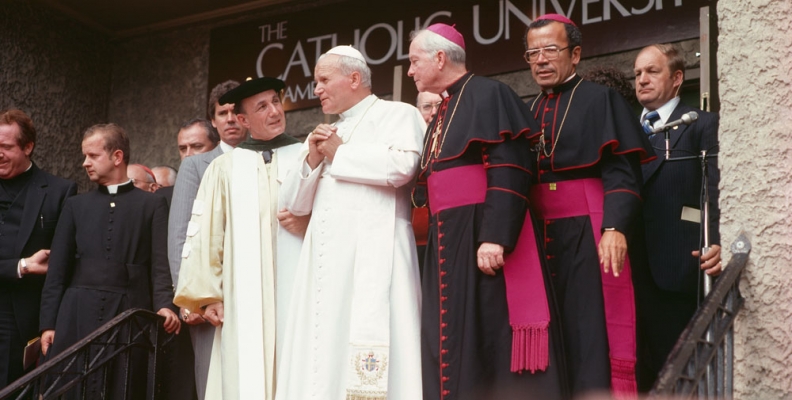
Lucia Silecchia: Thank You, Saint John Paul II!
Rare — and growing rarer by the day! — are those occasions when I wish that I were older. But, now and again, when I look at photos of Pope John Paul II’s 1979 visit to CUA, I can’t help but wish that I had been here to enjoy that visit as I was for Pope Benedict XVI and hope to be for Pope Francis. I was, at the time, in grammar school in New York and I remember watching Pope John Paul II’s visit unfold on my parents’ tiny black-and-white television in those dark ages before the Internet and social media. I also remember having a day or two of much-appreciated school holidays when the papal entourage made its way to New York. But, in anticipation of Pope Francis’s historic visit here, my thoughts have turned again to Saint John Paul II — the first pope I really remember and the pope who shaped my youth and young adulthood as part of the “John Paul II generation.” I remember the way he confronted a broken world in the vigor of his youth, and how he faced very public suffering and death with the serenity of his old age.
This spring, I had a chance to think again about Saint John Paul II in a more personal way when I traveled to Wadowice, his hometown, and visited the sites important to his youth. I saw the parish church where he was baptized and the baptismal font where, in his words, “it all began.” I saw the town square where he played with his young friends — many of whom would not see much of adulthood, losing their lives in the death camps or on the battlefields that would quickly engulf their lives. I saw the programs from his high school drama productions, and thought about how different the world would be if he had followed his early ambitions to be a poet or an actor. I saw the photos of the family he lost — a sister he never knew, a beloved mother who died when he was only 9, a brother studying medicine who died treating the ill, and a devoted father who passed from this life before young Karol was ever ordained a priest. I saw the dining hall where his father took him to eat when the two lived alone, and I saw the orphanage run by religious sisters who cared for him as a boy during the times when his father could not. In the interest of historic inquiry, I ate at a few bakeries that each claimed to sell the very crème cakes he enjoyed as a boy, and in the interest of curiosity, I visited the museum devoted to his life.
But, perhaps most intimately, I visited his childhood home. A three-room flat on the second floor of a modest building, there was a simple bedroom he shared with his father, a small kitchen, and a neat sitting room that went unused after the shadow of his mother’s death fell on the home. In those few rooms, he grew up and came to know the God who would sustain him in the many sufferings he knew in youth, the blessed Mother who would comfort him in the trials of his life, and the understanding of what it is to live with fear and hope, with joy and sorrow, with great love and great loss.
This home was located just across an alley from the parish church where Karol and his father would go to Mass each morning. What caught my eye was a large sundial mounted on the side of the church — a sundial now marked with the precise time of Saint John Paul II’s death. Over the sundial was a Polish inscription that read, “Czas Ucieka Wiecznosc Czeka” or, “Time Flies, Eternity Waits.” That made an impression on me, and so, of course, I had to go to the gift shop and buy a picture of the sundial to keep in my office.
“Time Flies, Eternity Waits.” These were words that young Karol would have seen out of his window every day and they are, I think, important words to live by. In a recent talk I gave to a group of lawyers, I mentioned that one of the most frequent replies we give to the question, “How are you?” is “I’m busy.” I’m not sure whether lawyers or Washingtonians are more prone to busy-ness than others, but I do know that it is so easy to get caught up in the things that make time fly. But, perhaps what gave Saint John Paul II the serenity, courage, and fortitude to live the life he did was knowing that in spite of all that makes time fly here on earth, it is eternity that waits — patiently and peacefully. Perhaps that is a reminder in the days ahead to do what is urgent, pressing, and necessary — but not at the expense of those things that are truly important because they point our way toward eternity. I would like to think that now, in the peaceful joy of eternity, Saint John Paul II prays much and often for his busy successor. I would also like to think that as the days leading up to Pope Francis’s visit fly by, that we will find much to remind us of the eternity that awaits us all.
— Lucia Silecchia is a professor of law at The Catholic University of America Columbus School of Law. She also is director of the International Human Rights Summer Law Program in Rome.

